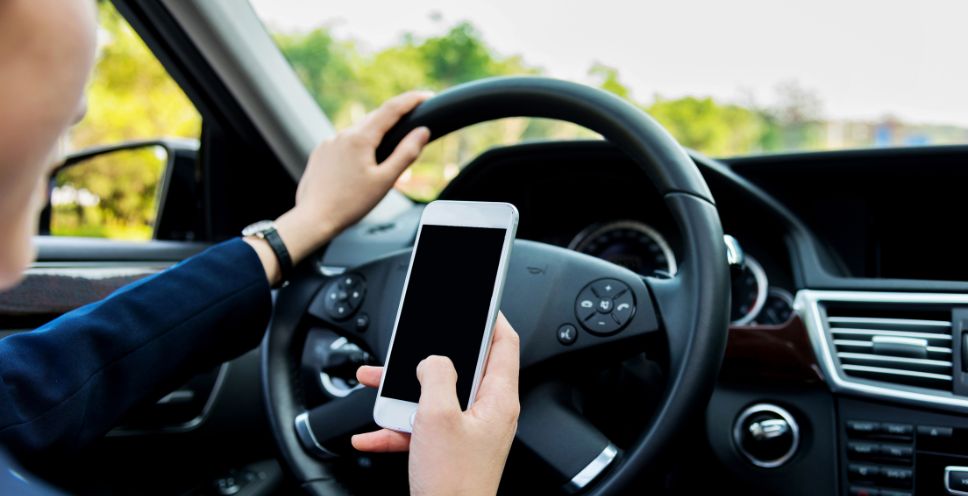Attention distracted drivers in Virginia: Holding a cell phone while driving is prohibited under Virginia’s hands-free law, with exceptions outlined by the law. Violating this law constitutes a traffic offense punishable by a fine, except under the exceptions provided. Furthermore, being cited for distracted driving could serve as substantial evidence in a personal injury lawsuit, illustrating the driver’s negligence.

What’s Different About the Updated Hands-Free Law?
Prior to 2021, Virginia’s hands-free law primarily targeted cell phone usage within work zones, prohibiting drivers from holding a cell phone in such areas and from typing or reading messages while driving.
The recent amendment significantly expands the scope of the law. It now prohibits drivers from holding a cell phone while driving in any location, extending beyond just work zones, with only a few specified exceptions. The restriction on typing or reading text messages and emails while driving remains unchanged.
Are There Any Exemptions to the Hands-Free Law?
Within Virginia Code § 46.2-818.2, there are specific exemptions allowing drivers to hold a cell phone in certain circumstances. These exemptions are:
- Emergency vehicle drivers engaged in official duties.
- Drivers who are legally parked or stopped.
- Drivers utilizing handheld devices to report emergencies.
- Drivers utilizing amateur or citizen band radios.
- Drivers operating official Department of Transportation vehicles, under certain conditions.
Is It Against the Law to Engage in Cellphone Conversations While Driving in Virginia?
Technically, Virginia’s hands-free regulation doesn’t prohibit talking on a cell phone while driving. The law specifies that holding a cell phone is prohibited, as not talking on it. Thus, while holding a phone during a call is unlawful, conversing on the phone through a hands-free device is permitted.
What are the Consequences of Using a Handheld Device While Driving in Virginia?
For the first offense of Virginia’s hands-free law, the penalty is a fine of $125. Subsequent violations incur a fine of $250, while offenses within work zones carry a mandatory $250 fine.
Apart from these fines, a citation for breaking Virginia’s hands-free regulation may lead to further consequences if the violation is linked to an accident. A personal injury lawyer could argue that such a breach constitutes negligence on the part of the driver, thereby holding them accountable for the collision and any resulting injuries to others.
Furthermore, if the drivers themselves were injured in the accident, they might encounter greater difficulty in seeking financial compensation. Virginia’s pure contributory negligence statute stipulates that injured parties cannot recover damages if they played any part in causing their own injuries.
Is it Considered Reckless Driving to Use a Cellphone While Operating a Vehicle?
According to Virginia Code § 46.2-852, driving in a manner that endangers others or their property is unlawful. While the statute lists various actions that could amount to reckless driving, it notably does not include cellphone usage. Despite the potential risk posed by cellphone use while driving, courts have reasoned that since texting is separately penalized, it cannot be prosecuted as a misdemeanor under reckless driving laws.
However, these regulations leave room for interpretation. A prosecutor may argue that a particular instance of cellphone use while driving demonstrates recklessness, depending on the circumstances surrounding the alleged violation.
What Steps Should I Take Following an Accident Caused by Cell Phone Use While Driving?
Your immediate actions following a collision involving a driver using a cell phone can significantly impact any future personal injury claim. Here are essential steps to safeguard your rights & increase the likelihood of obtaining fair compensation:
Notify the authorities: If law enforcement didn’t attend the scene and compile an accident report, you should file one yourself. This report can serve as vital evidence should you pursue s claim or legal action against the distracted driver.
Document the incident: Capture photographs of your injuries, your vehicle’s damage, and any pertinent details illustrating how the accident unfolded. Draft a narrative outlining the sequence of events and your observations while they’re still vivid in your memory.
Seek medical treatment and maintain comprehensive records: Adhere to all medical advice and treatments prescribed by your physician. Request copies of any treatment plans or documents from them. Keeping detailed records of your injuries and recovery journey is crucial for maximizing your potential compensation.
Refrain from communicating with the other driver’s insurance provider: Insurance companies aim to minimize payouts. If contacted by the other party’s insurer, it is crucial to obtain guidance from a reputable attorney before providing any statements or agreeing to a settlement.
Exercise caution on social media platforms: Information shared publicly about the accident could be used against you by insurance companies. It’s advisable to refrain from discussing the incident on public forums.
How Much Compensation Might I Receive Following a Distracted Driving Accident?
The potential compensation you could receive hinges on various factors, such as the severity of your injuries, the insurance policies in play, and the determination of liability. However, you may be entitled to compensation for:
- Healthcare expenses, encompassing the expenses for forthcoming medical interventions you need
- Lost wages
- Reduced future earnings
- Pain and suffering
- Emotional distress
- Lower quality of life
Connect with a Traffic Lawyer in Virginia
Despite Virginia’s hands-free driving law, many drivers still use cell phones while driving, risking accidents. If facing traffic violations, contact Jad Sarsour Criminal Defense Attorney. Schedule a free consultation with a Virginia traffic lawyer.
